“I lost my heart for Jesus of Nazareth”: Charles de Foucauld
The Pope's words at the General Audience
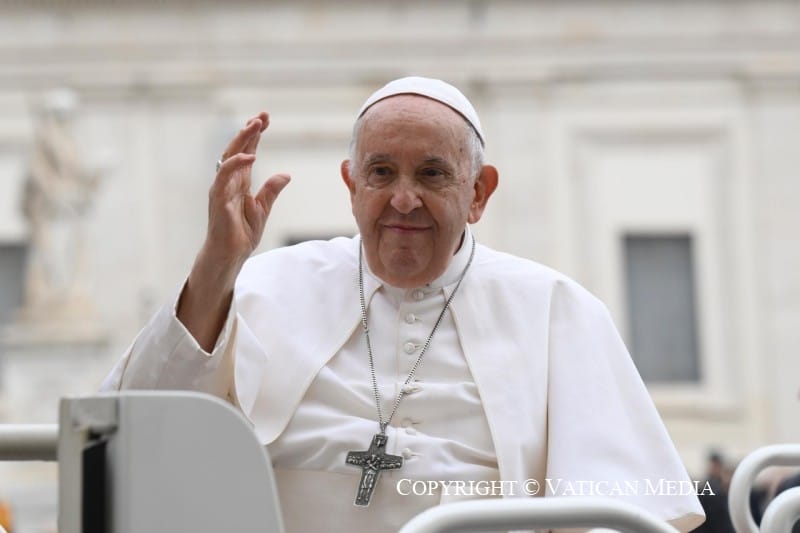
This morning’s General Audience took Place at 9:00 a.m. in St. Peter’s Square.
In his address, the Pope, continuing the cycle of catechesis The Passion for Evangelisation: The Apostolic Zeal of the Believer, focused his meditation on the theme “Saint Charles de Foucauld, beating heart of charity in the hidden life” (Reading: Lk 2:51-52).
After summarising His catechesis in the different languages, the Holy Father addressed special greeting expressions to the faithful present. He then turned his thoughts to the situation in Palestine and Israel and proclaimed Friday 27 October as a day of fasting, prayer, and penance to implore peace.
The General Audience concluded by reciting the Pater Noster and the Apostolic.
Catechesis. The passion for evangelization: the apostolic zeal of the believer. 23. Saint Charles de Foucauld, the beating heart of charity in the hidden life
Dear brothers and sisters, good morning!
Let us continue in our encounter with some Christian witnesses rich in zeal for proclaiming the Gospel. Apostolic zeal, the zeal for proclamation: and we are looking at some Christians who have been an example of this apostolic zeal. Today I would like to talk to you about a man who made Jesus and his poorest brothers the passion of his life. I refer to Saint Charles de Foucauld, who “drawing upon his intense experience of God, made a journey of transformation towards feeling a brother to all” (Encyclical Letter Fratelli tutti, 286).
And what is the “secret” of Charles de Foucauld, of his life? After living a youth far from God, without believing in anything other than the disordered pursuit of pleasure, he confides this to a non-believing friend, to whom, after having converted by accepting the grace of God’s forgiveness in Confession, he reveals the reason for his life. He writes: “I have lost my heart to Jesus of Nazareth”. [1] Brother Charles thus reminds us that the first step in evangelizing is to have Jesus inside one’s heart; it is to “fall head over heels” for him. If this does not happen, we can hardly show it with our lives. Instead, we risk talking about ourselves, the group to which we belong, a morality or, even worse, a set of rules, but not about Jesus, his love, his mercy. I see this in some new movements that are emerging: they talk about their vision of humanity, they talk about their spirituality and they feel theirs is a new path… But why do you not talk about Jesus? They talk about many things, about organization, about spiritual journeys, but they do not know how to talk about Jesus. I think that today it would be good for each one of us to ask him- or herself: “Do I have Jesus at the centre of my heart? Have I ‘lost my head’ a bit for Jesus?”.
Charles had, to the extent that he goes from attraction to Jesus to imitation of Jesus. Advised by his confessor, he goes to the Holy Land to visit the places where the Lord lived and to walk where the Master walked. In particular, it is in Nazareth that he realises he must be formed in the school of Christ. He experiences an intense relationship with the Lord, spends long hours reading the Gospels, and feels like his little brother. And as he gets to know Jesus, the desire to make Jesus known arises in him; it always happens like this. When one of us gets to know Jesus better, the desire to make him known, to share this treasure, arises. In commenting on the account of Our Lady’s visit to Saint Elizabeth, he makes him say, to Our Lady, to him: “I have given myself to the world… take me to the world”. Yes, but how is this done? Like Mary in the mystery of the Visitation: “in silence, by example, by life”. [2] By life, because “our whole existence”, writes Brother Charles, “must cry out the Gospel”. [3] And very often our existence calls out worldliness, it calls out many stupid things, strange things, and he says: “No, all our existence must shout out the Gospel”.
He then decides to settle in distant regions to cry out the Gospel in the silence, living in the spirit of Nazareth, in poverty and concealment. He does to the Sahara Desert, among non-Christians, and he goes there as a friend and a brother, bearing the meekness of Jesus the Eucharist. Charles lets Jesus act silently, convinced that the “Eucharistic life” evangelizes. Indeed, he believes that Christ is the first evangelizer. And so he remains in prayer at Jesus’ feet, before the Tabernacle, for a dozen hours a day, sure that the evangelizing force resides there and feeling that it is Jesus who will bring him close to so many distant brothers. And do we, I ask myself, believe in the power of the Eucharist? Does our going out to others, our service, find its beginning and its fulfilment there, in adoration? I am convinced that we have lost the sense of adoration: we must regain it, starting with us consecrated persons, bishops, priests, nuns and all consecrated persons. “Waste” time before the tabernacle, regain the sense of adoration.
Charles de Foucauld wrote: “Every Christian is an apostle”, [4] and reminds a lay friend that “there need to be laypeople close to priests, to see what the priest does not see, who evangelize with a proximity of charity, with goodness for everyone, with affection always ready to be given”. [5] The saintly laypeople, not climbers, but those laypeople, that layman, that laywoman, who love Jesus, make the priest understand that he is not a functionary, he is a mediator, a priest. How we priests need to have beside us those laypeople who truly believe, and who teach us the way by their witness.
Charles de Foucauld, with this lay experience, foreshadows the times of Vatican Council II; he intuits the importance of the laity and understands that the proclamation of the Gospel is up to the entire people of God. But how can we increase this participation? The way Charles de Foucauld did: by kneeling and welcoming the action of the Spirit, who always inspires new ways to engage, meet, listen and dialogue, always in collaboration and trust, always in communion with the Church and pastors.
Saint Charles de Foucauld, a figure who is a prophecy for our time, bore witness to the beauty of communicating the Gospel through the apostolate of meekness: considering himself a “universal brother” and welcoming everyone, he shows us the evangelizing force of meekness, of tenderness. Let us not forget that God’s style is summarized in three words: proximity, compassion and tenderness. God is always near, he is always compassionate, he is always tender. And Christian witness must take this road: of proximity, compassion and tenderness. And this is how he was, meek and tender. He wanted everyone he met to see, through his goodness, the goodness of Jesus. Indeed, he used to say that he was a “servant to someone much better than me”. [6] Living Jesus’ goodness led him to forge fraternal friendships with the bonds of friendship with the poor, with the Tuareg, with those furthest from his mentality. Gradually these bonds generated fraternity, inclusion, appreciation of the other’s culture. Goodness is simple and asks us to be simple people, who are not afraid to offer a smile. And with his smile, with his simplicity, Brother Charles bore witness to the Gospel. Never by proselytism, never: by witness. One does not evangelize by proselytism, but by witness, by attraction.
So finally, let us ask ourselves whether we bring Christian joy, Christian meekness, Christian tenderness, Christian compassion, Christian proximity. Thank you.
__________________________
[1] Lettres à un ami de lycée. Correspondance avec Gabriel Tourdes (1874-1915), Paris 2010, 161.
[2] Crier l’Evangile, Montrouge 2004, 49.
[3] M/314 in C. de Foucauld, La bonté de Dieu. Méditations sur les Saints Evangiles (1), Montrouge 2002, 285.
[4] Letter to Joseph Hours, in Correspondances lyonnaises (1904-1916), Paris 2005, 92.
[5] Ivi, 90.
[6] Carnets de Tamanrasset (1905-1916), Paris 1986, 188.
__________________________________________
Special Greetings
I extend a warm welcome to the English-speaking pilgrims and visitors taking part in today’s Audience, especially the groups from Ireland, Norway, Indonesia, Malaysia, the Philippines, Vietnam, Canada and the United States of America. I offer a special greeting to the university students taking part in the Rome International Seminar for Peace. I also greet the priests of the Institute for Continuing Theological Education of the Pontifical North American College. Upon all of you I invoke the joy and peace of our Lord Jesus Christ. God bless you!
____________________________________________
Appeal of the Holy Father
Today too, dear brothers and sisters, our thoughts turn to Palestine and Israel. The number of victims is rising and the situation in Gaza is desperate. Please, let everything possible be done to avoid a humanitarian disaster. The possible widening of the conflict is disturbing, while so many war fronts are already open in the world. May weapons be silenced, and let us heed the cry for peace of the poor, the people, the children… Brothers and sisters, war does not solve any problem: it sows only death and destruction, foments hate, proliferates revenge. War cancels out the future, it cancels out the future. I urge believers to take just one side in this conflict: that of peace. But not in words – in prayer, with total dedication. With this in mind, I have decided to call for a day of fasting and prayer on Friday 27 October, a day of penance to which I invite sisters and brothers of the various Christian denominations, those belonging to other religions and all those who have at heart the cause of peace in the world, to join in as they see fit. That evening, at 18.00 at Saint Peter’s, we will spend an hour of prayer in a spirit of penance to implore peace in our time, peace in this world. I ask all the particular Churches to participate by arranging similar activities involving the People of God.
____________________________
Summary of the Holy Father’s words
Dear brothers and sisters: In our continuing catechesis on apostolic zeal, we have been reflecting on the spread of the Gospel through the witness of men and women of every time and place. Today we consider the life of Saint Charles de Foucauld, whose passionate love of Christ led him to settle in the Sahara desert and to become a brother and friend to the poor. Following his conversion, Charles visited the Holy Land and was moved to devote his life to bringing Christ to others as Mary did at the Visitation: in silence and by example. Dwelling as a hermit among the Tuareg people, he bore witness to the Lord above all by a life of poverty and humility centred on quiet prayer before the Eucharist, with utter confidence in its power to draw hearts to Jesus. By identifying completely with the poor, he sought to become a “universal brother” and in this way to share with them the joy of the Gospel. May the example of Saint Charles de Foucauld inspire us, in the circumstances of our daily lives, to bear quiet and joyful witness to the Lord, and to see and honour him in each of our brothers and sisters.
Related
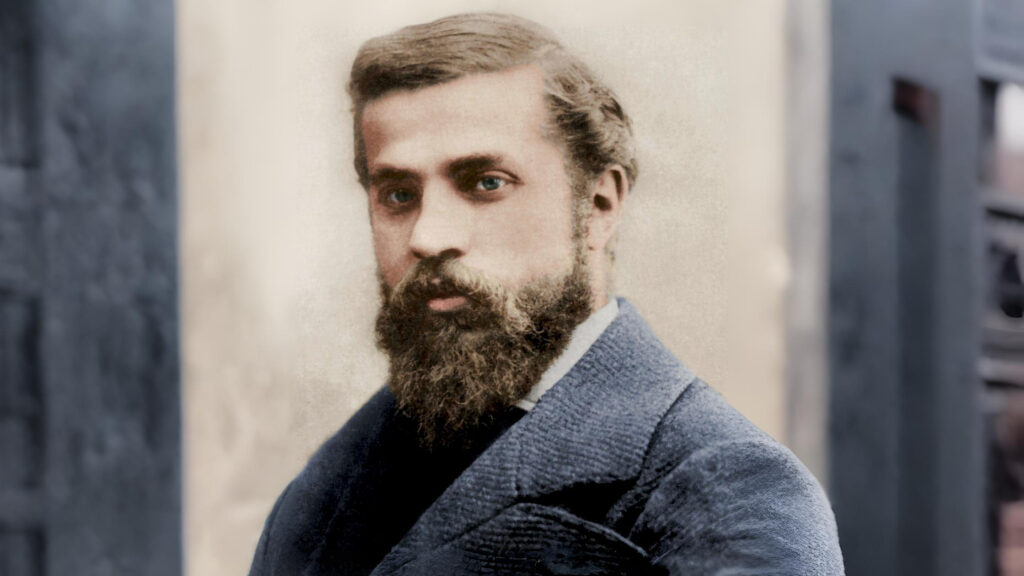
Antoni Gaudí Takes Another Step Toward the Altar: Declared Venerable by the Church
Exaudi Staff
14 April, 2025
2 min
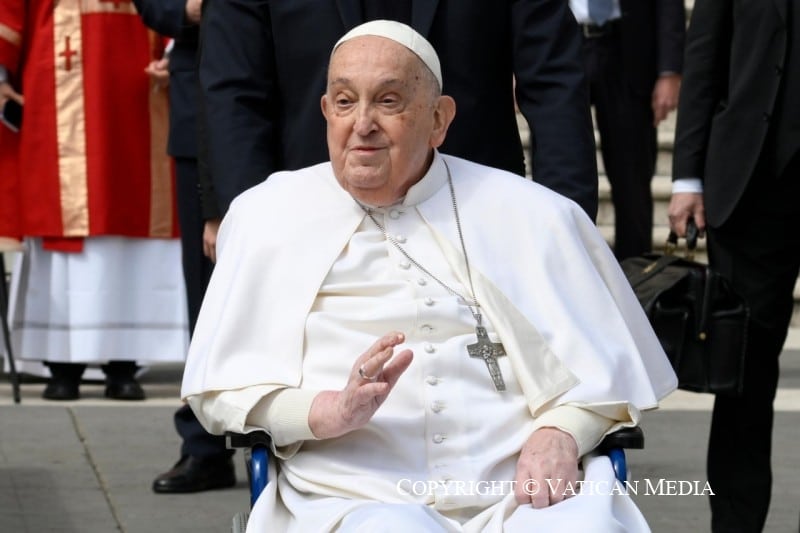
Palm Sunday: “Father, into your hands I commend my spirit”
Exaudi Staff
13 April, 2025
2 min
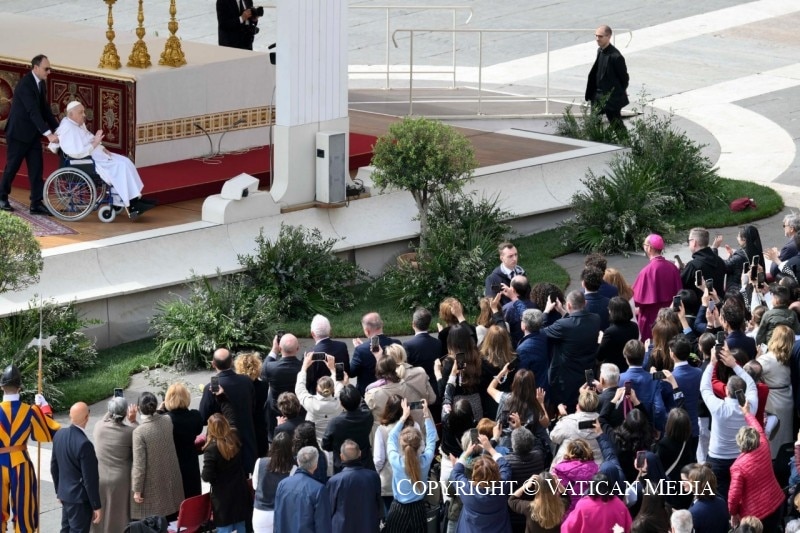
“Jesus’ passion becomes compassion when we reach out to those who can no longer bear it”
Exaudi Staff
13 April, 2025
5 min
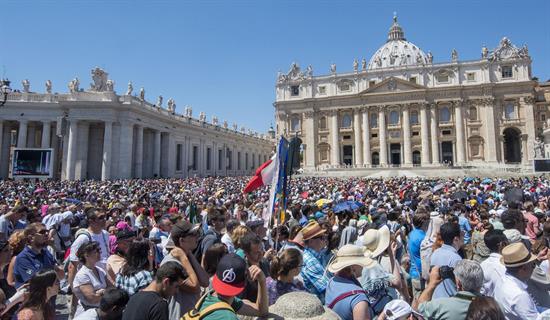
Pope Francis Sends a Message of Hope to the Young People of the UNIV 2025 International Congress
Exaudi Staff
11 April, 2025
5 min
 (EN)
(EN)
 (ES)
(ES)
 (IT)
(IT)

